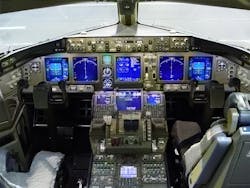Booz Allen and Ball Aerospace to develop Air Force trusted computing technology for avionics cyber security
WRIGHT-PATTERSON AFB, Ohio – U.S. Air Force researchers are asking two defense companies to develop and demonstrate cyber security tools to make legacy and future Air Force weapon systems far more resilient to cyber attacks than they are today.
Officials of the Air Force Research Laboratory at Wright-Patterson Air Force Base, Ohio, awarded contracts Tuesday to Booz Allen Hamilton Inc. in McLean, Va., and to Ball Aerospace & Technologies Corp. in Boulder, Colo., for the Trusted and Elastic Military Platforms and Electronic Warfare (EW) System Technologies (TEMPEST) program.
The companies will share as much as $200 million for a portion of the TEMPEST program called Agile and Resilient Platform Architectures (ARPA). The objective is to develop, prototype, and demonstrate cyber security technologies to protect the avionics in Air Force weapon systems.
Booz Allen and Ball Aerospace will perform enhanced development, technology demonstrations, component development, and prototyping of tools, techniques, and capabilities to identify and mitigate vulnerabilities in avionics systems; harden and protect avionics systems against cyber-attack; advance current techniques to detect, respond, and adapt to new and unusual cyber-attacks on avionics in real-time; demonstrate integrated mission systems and advanced prototype components leveraging current and emerging open-systems architecture standards and approaches; and prototype agile next-generation architectures to enable rapid integration and fielding of enhanced trusted computing in Air Force avionics.
The companies will develop security technologies that will include assessment and testing tools; vulnerability mitigation and cyber-hardening technologies; malware detection and adaptive response techniques; and technologies to secure open-systems and agile-architecture platforms.
Booz Allen and Ball Aerospace engineer swill develop cyber security technologies such as tools for avionics vulnerability assessment and testing; modeling and simulation environments to test avionics and cyber protection; reverse engineering and system assurance tools to identify vulnerabilities or malicious logic in software, firmware, or hardware; malware detection tools and countermeasures; technologies to mitigate vulnerabilities and cyber-harden avionics; and techniques to detect, adapt to, and react to the kinds of cyber attacks that may never have been seen before.
The companies also will develop techniques to develop cyber security and resiliency for next-generation avionics; improve the resiliency of avionics at different stages of the acquisition life cycle from hardening existing legacy systems to designing cutting-edge security technologies with future avionics systems.
Ultimately, the companies will develop, demonstrate, and prototype a digital architecture that combines digital engineering, software factories, and current advanced avionics architecture technologies to advance warfighting capability for current and future Air Force weapon systems.
On these contracts Booz Allen will do the work in Beavercreek, Ohio, and Ball Aerospace will do the work at Wright-Patterson Air Force Base, Ohio. Both companies should be finished by August 2028.
For more information contact Booz Allen Hamilton online at www.boozallen.com, Ball Aerospace & Technologies at www.ball.com/aerospace, or the Air Force Research Laboratory at www.afrl.af.mil.
About the Author
John Keller
Editor-in-Chief
John Keller is the Editor-in-Chief, Military & Aerospace Electronics Magazine--provides extensive coverage and analysis of enabling electronics and optoelectronic technologies in military, space and commercial aviation applications. John has been a member of the Military & Aerospace Electronics staff since 1989 and chief editor since 1995.
